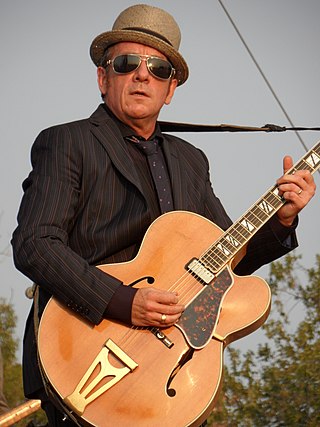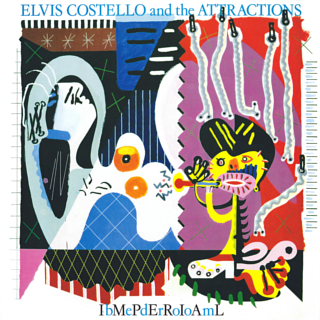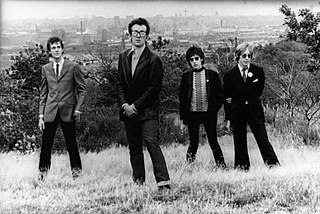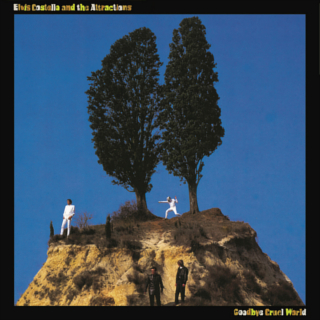
Declan Patrick MacManus, better known by his stage name Elvis Costello, is an English singer, songwriter, record producer, author and television host. According to Rolling Stone, Costello "reinvigorated the literate, lyrical traditions of Bob Dylan and Van Morrison with the raw energy and sass that were principal ethics of punk", noting the "construction of his songs, which set densely layered wordplay in an ever-expanding repertoire of styles." His first album, My Aim Is True (1977), spawned no hit singles, but contains some of Costello's best-known songs, including the ballad "Alison". Costello's next two albums, This Year's Model (1978) and Armed Forces (1979), recorded with his backing band the Attractions, helped define the new wave genre. From late 1977 until early 1980, each of the eight singles he released reached the UK Top 30. His biggest hit single, "Oliver's Army" (1979), sold more than 500,000 copies in Britain. He has had more modest commercial success in the US, but has earned much critical praise. From 1977 until the early 2000s, Costello's albums regularly ranked high on the Village Voice Pazz & Jop critics' poll, with This Year's Model and Imperial Bedroom (1982) voted the best album of their respective years. His biggest US hit single, "Veronica" (1989), reached number 19 on the Billboard Hot 100.

Almost Blue is the sixth studio album by the English singer-songwriter Elvis Costello, and his fifth with the Attractions—keyboardist Steve Nieve, bassist Bruce Thomas and drummer Pete Thomas. It was recorded in May 1981 in Nashville, Tennessee, and released in October the same year. A departure from Costello's previous works, it is a covers album composed entirely of country music songs, including works written by Hank Williams and George Jones. The project originated with Costello's desire to record a collection of covers after his two previous studio albums commercially underperformed following Armed Forces (1979).

Imperial Bedroom is the seventh studio album by the English singer-songwriter Elvis Costello, and his sixth with the Attractions—keyboardist Steve Nieve, bassist Bruce Thomas and drummer Pete Thomas. It was released on 2 July 1982 through F-Beat Records in the United Kingdom and Columbia Records in the United States. Recording took place at AIR Studios in London from late 1981 to early 1982 with production handled by Geoff Emerick. Placing an emphasis on studio experimentation, the album saw the group use unusual instruments, including harpsichord, accordion and strings arranged by Nieve. Songs were rewritten constantly while Costello tinkered with the recordings, adding numerous overdubs.

Get Happy!! is the fourth studio album by the English singer-songwriter Elvis Costello, and his third with the Attractions — keyboardist Steve Nieve, bassist Bruce Thomas and drummer Pete Thomas. It was released on 15 February 1980 through F-Beat Records in the United Kingdom and Columbia Records in the United States. Produced by Nick Lowe and engineered by Roger Béchirian, the sessions began in London but moved to the Netherlands after Costello found the material derivative of his previous album, Armed Forces (1979). The sessions were problematic but resulted in a large number of songs; the final album contains 20 tracks across a single LP.

Punch the Clock is the eighth studio album by the English singer-songwriter Elvis Costello, and his seventh with the Attractions—keyboardist Steve Nieve, bassist Bruce Thomas and drummer Pete Thomas. It was released on 5 August 1983 through F-Beat Records in the United Kingdom and Columbia Records in the United States. Produced by Clive Langer and Alan Winstanley, the album was Costello's attempt at making a commercial record following years of dwindling commercial success. It was recorded at London's AIR Studios in early 1983 and features contributions from the TKO Horns and Afrodiziak.

Blood & Chocolate is the eleventh studio album by the English singer-songwriter Elvis Costello, and his ninth album with the Attractions—keyboardist Steve Nieve, bassist Bruce Thomas and drummer Pete Thomas. It was released on 15 September 1986 through Demon and Columbia Records. After mostly using outside musicians for his previous album King of America, Costello reunited the Attractions and his former producer Nick Lowe for Blood & Chocolate. Recorded in London during a period of heightened tensions between Costello and the Attractions, the tracks were recorded quickly, mostly live in first takes, while the band were set up simultaneously in the same room at Olympic Studios. The Pogues' bassist Cait O'Riordan sang backing vocals on two tracks.

King of America is the tenth studio album by the English singer-songwriter Elvis Costello, released on 21 February 1986. Co-produced by Costello and T Bone Burnett, the album originated following a series of tours the two made under the name "the Coward Brothers". Recording took place in mid-1985 at various studios in Los Angeles, California, with a group of American session musicians dubbed "the Confederates". Selected by Burnett, they included Ray Brown, Earl Palmer and former members of Elvis Presley's TCB Band. Costello's regular backing band, the Attractions, were intended to appear on half of the album before poor sessions led to them appearing on only one track, "Suit of Lights".

The Attractions were an English backing band for the English new wave musician Elvis Costello between 1977 and 1986, and again from 1994 to 1996. They consisted of Steve Nieve (keyboards), Bruce Thomas, and Pete Thomas (drums). They also released one album as an independent entity, without Costello, in 1980.

Goodbye Cruel World is the ninth studio album by the English singer-songwriter Elvis Costello, and his eighth with the Attractions—keyboardist Steve Nieve, bassist Bruce Thomas and drummer Pete Thomas. It was released on 18 June 1984 through F-Beat Records in the United Kingdom and Columbia Records in the United States. Produced by Clive Langer and Alan Winstanley, who returned from 1983's Punch the Clock, the album was recorded at London's Sarm West Studios in March 1984 during a period of turmoil for the artist. The problematic sessions included disagreements between Costello and the producers over the album's direction and high tensions amongst the Attractions.

All This Useless Beauty is the seventeenth studio album by the English singer-songwriter Elvis Costello, released in 1996 by Warner Bros. Records. It is his tenth and final album with his long-standing backing band the Attractions, and the last album he delivered under his contract to the Warner Bros. label, his contract expiring with a further compilation album, Extreme Honey. It peaked at number 28 on the UK album chart, and at number 53 on the Billboard 200.

Kojak Variety is an album by English musician Elvis Costello, released in 1995 through Warner Bros. Records. It is composed of cover songs written by others. In 2004, Rhino Records reissued an expanded, double-CD version of the album, containing a bonus disc.

The discography of the English singer-songwriter Elvis Costello includes 33 studio albums, 6 live albums, 17 compilation albums, 6 tribute albums, 2 extended plays, 62 singles and 4 box sets. This page distinguishes between United States and United Kingdom release dates and record labels. Of note are the reissue series, Costello's back catalogue having undergone reissue three times by three different companies.
Alan Kenneth Winstanley is an English record producer and songwriter, active from the mid-1970s onwards. He usually works with Clive Langer.

The Best of Elvis Costello and the Attractions is a compilation album by English musician Elvis Costello and his backing band the Attractions, released in 1985. It was the first of what would be many career-spanning compilation albums of previously released material for Costello.

Out of Our Idiot is a compilation album by English musician Elvis Costello. It was released only in the United Kingdom on 4 December 1987, through Demon Records. The album consists of B-sides, non-album tracks, and previously unreleased material recorded between 1979 and 1987. Rather than being credited to Elvis Costello, the album is instead credited to "Various Artists" due to Costello's use of pseudonyms on many of the tracks, as well as the numerous collaborations with other artists, including Jimmy Cliff, T Bone Burnett, and Nick Lowe.
"Leave My Kitten Alone" is a song written by Little Willie John, Titus Turner, and James McDougal, first recorded by Little Willie John and released in 1959 as a single through King Records. It is an R&B song that follows a 24-bar blues format.

"Blue Chair" is a song written by new wave musician Elvis Costello and recorded by Costello with his backing band the Attractions. The song first appeared on Costello's 1986 album, Blood & Chocolate. First intended for Costello's previous album King of America, the song was scrapped during that session and reworked with the Attractions around Steve Nieve's piano part.

"I Hope You're Happy Now" is a song written by new wave musician Elvis Costello, recorded by Costello and the Attractions. The track was released on his 1986 album Blood & Chocolate after several failed attempts to record the song for earlier releases.
"Riot Act" is a song written by new wave musician Elvis Costello and performed by Costello and the Attractions for his 1980 album Get Happy!!. Costello wrote the song as a response to the controversy that had surrounded him in his professional and personal life, particularly relating to his incident in Columbus, Ohio. Recorded originally as a stripped-down acoustic demo, the song was fleshed out in the studio with the Attractions.
"Jack of All Parades" is a song by the English singer-songwriter Elvis Costello, which was released on his tenth studio album King of America (1986). The song was written by Costello, credited under his real name Declan MacManus, and produced by T Bone Burnett, Costello and Larry Kalman Hirsch. As a musician, Costello is credited on the track as "The Little Hands of Concrete". It is a love song, inspired by his new relationship with Cait O'Riordan of the Pogues, and is unusual in Costello's catalogue for being a positive love song.
















